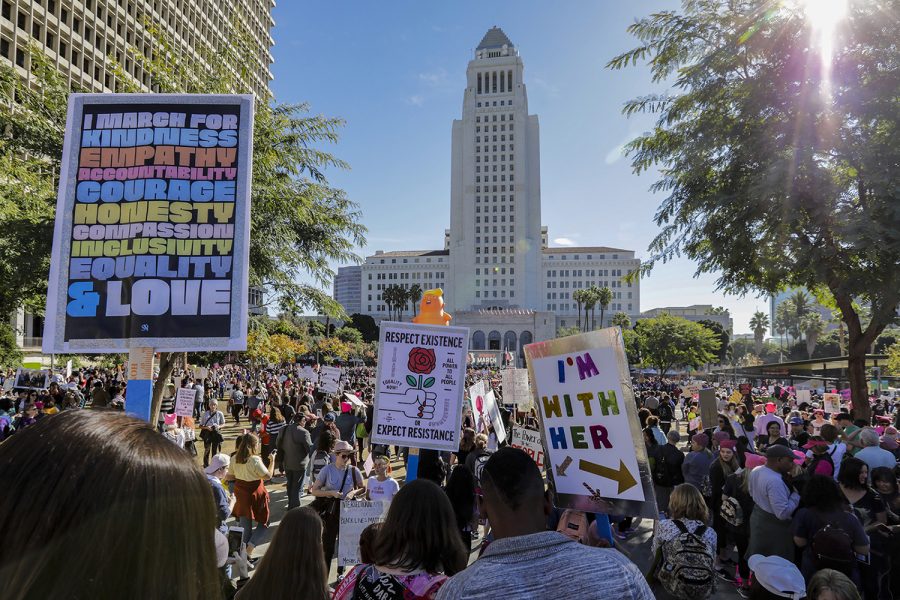Opinion | Why #NotAllMen is damaging to the fight against sexual violence
Conversations about violence against women often turn into conversations about men’s feelings, and it isn’t helping anyone.
Irfan Khan/Los Angeles Times/TNS
The third annual Women’s March in Los Angeles in January drew thousands of participants. Gay men need to realize the common cause they have with feminists.
March 25, 2021
On March 3, Sarah Everard went missing in London. She did everything we’re told to – she wasn’t out too late, she wore bright clothes, and she talked on the phone while she walked. Her body was found a week later.
Yet, instead of rallying to confront the problem or provide support, men came out in masses waving the “#NotAllMen” banner.
One in every three women has experienced sexual violence in their lifetime, according to the Centers for Disease Control and Prevention. According to the Rape, Abuse, and Incest National Network, only five out of every 1,000 perpetrators of sexual violence will be convicted. So why does the conversation so often focus on absolving men, rather than making the world a safer place for women?
To preface this discussion, let me be very clear. Women are well aware that not every man around us is an abuser. But focusing on the supposed innocence of men in these contexts is extraordinarily unhelpful. Here’s why:
First, it ignores the everyday experiences of women. Every woman I know has been catcalled on the street, or inappropriately touched at a bar. Every woman I know has walked home with her keys or her pepper spray at the ready.
It’s not only strangers we have to be wary of. Seventy percent of rapes in the U.S. are committed by someone the victim already knows, and 137 women are killed by an intimate partner every day.
All women are subjected to these aggressions. Telling us that “not all men” harm women discredits women’s fears in favor of making men feel better. It prioritizes men’s comfort over women’s valid concerns, and it says “you must acknowledge that I’m a good person before I will acknowledge the problem.”
The rhetoric we use to have these conversations matters. Society consistently places the burden on women to protect themselves. Don’t go out alone. Don’t wear this. If you do, whatever happens is on you. In failing to focus on the actual cause of the problem — that is, those committing the abuse — blame is placed on the victims. #NotAllMen only shifts the focus further away from the root problem — the actual perpetrators.
It also contributes nothing to the resolution of the problem.
According to a study by Stand Up International, 78 percent of women have been sexually harassed in public spaces. However, only 25 percent of those women said someone stepped in to help them.
Maybe you’ve never sexually assaulted or harassed someone. But have you confronted those who have? Have you stepped in when you’ve seen a woman being harassed? Have you actively made an effort to change the demeaning rhetoric the people around you use to talk about women?
If your only response to sexual harassment is to say, “but I don’t do that!” and then move on, you must ask yourself: what does saying “not all men” contribute to the resolution of the problem? What purpose does this phrase really serve, other than prioritizing the comfort of “good” guys while failing to hold the bad ones accountable?
It seems that every conversation about violence against women turns into a conversation about men’s feelings, and it’s exhausting. Women are not fighting all men. We’re fighting the structures that enable sexual abuse to continue unfettered. Not every man takes an active part in these structures. But until they recognize and take part in dismantling the system, they are complicit.
Listen to the women around you when they tell their stories. Ask what you can do to make a difference, and then do it. The conversation needs to change so that it highlights the problem and those who are responsible if any progress is to be made.
Columns reflect the opinions of the authors and are not necessarily those of the Editorial Board, The Daily Iowan, or other organizations in which the author may be involved.



